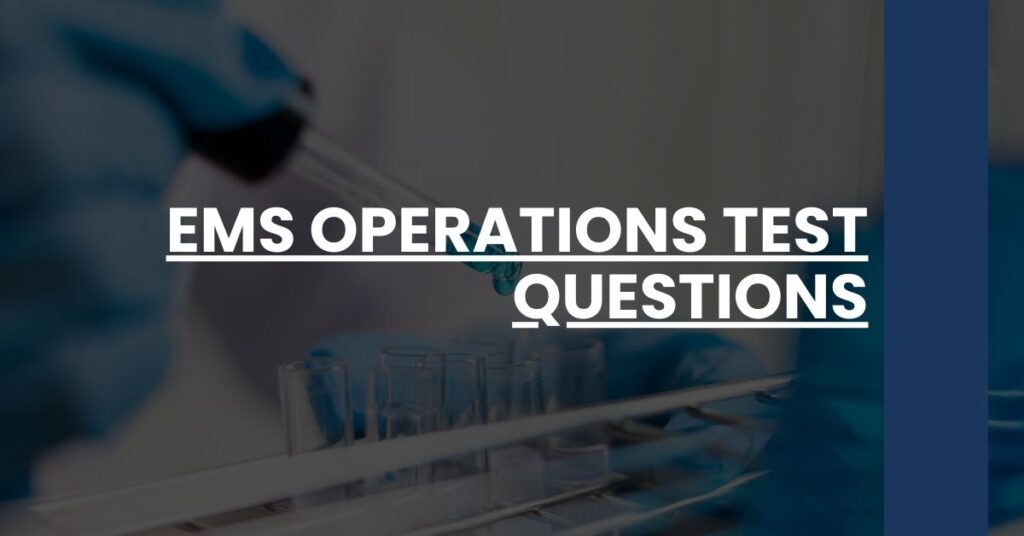EMS Operations test questions are pivotal for anyone aiming to excel in the medical emergency field.
- Grasp Key Concepts: Understand incident command systems integral to EMS operations.
- Navigate Exam Format: Familiarize with the question types, from multiple-choice to scenario-based.
- Optimize Preparation: Access study materials tailored to enhance your learning.
Master EMS Operations test questions for your success!
- Understanding EMS Operations
- Key Areas in EMS Operations Exams
- Types of Questions on EMS Operations Tests
- Preparing for the Test: Study Strategies and Resources
- Practical Application Scenarios
- Commonly Misunderstood Concepts in EMS Operations
- Test-Taking Strategies for EMS Operations
- Sample EMS Operations Test Questions and Analysis
- Staying Current: The Importance of Up-to-Date Knowledge
- Conclusion: Your Pathway to EMS Operations Mastery
Understanding EMS Operations
Emergency Medical Services (EMS) operations are the backbone of healthcare in critical situations, ensuring the timely and efficient delivery of life-saving interventions. As a healthcare professional or aspiring EMS provider, it’s crucial to understand the intricate tapestry of processes that make up EMS Operations—a complex system that spans multiple components and roles. Examination tests aim to assess your grasp of this vital component of emergency care, sharpening your decision-making skills for when every second counts.
What is EMS Operations?
At the heart of EMS Operations lies the coordination of emergency medical care and support services. This discipline is dedicated to the seamless functioning of various facets including:
- Emergency Dispatch: The first point of contact in emergencies, responsible for garnering and dispatching critical information.
- Medical Oversight: Ensuring the quality and standards of care are upheld across all EMS activities.
- Equipment and Logistics: Managing the array of tools necessary for patient care, from defibrillators to transportation vehicles, and everything in between.
- Regulations and Compliance: Staying abreast of state and federal requirements that govern EMS activities.
Why is EMS Operations Essential?
Your ability to navigate the complexities of EMS Operations can be the difference between life and death. From effectively coordinating disaster response to optimizing the flow of critical care, this discipline is a testament to your capability to handle high-pressure situations with precision and care—an attribute all EMS providers must embody.
Key Areas in EMS Operations Exams
When prepping for EMS Operations test questions, direct your energies towards mastering key areas that form the cornerstone of the discipline.
Incident Management Systems and Strategies
Handling a crisis requires an intricate understanding of organizational frameworks like the Incident Command System (ICS), a standard that provides a common hierarchy for response personnel to operate within during emergencies.
Resource Allocation and Logistics
Examinations often test your skill at distributing available resources efficiently. Anticipate scenarios related to:
- Ambulance Utilization: Optimal use and distribution of ambulances to ensure rapid response times.
- Equipment Management: Keeping track of crucial life-saving equipment amidst chaotic environments.
Patient Triage and Prioritization
You’ll likely encounter questions aimed at evaluating your ability to assess patient needs and prioritize care, often using tools such as START (Simple Triage and Rapid Treatment) triage protocols.
Communication Protocols
EMS operations are contingent on clear communication—expect to answer questions about radio communication etiquette and inter-agency coordination practices.
Types of Questions on EMS Operations Tests
Each EMS Operations exam invites a slew of question formats designed to challenge your knowledge and practical decision-making abilities. Familiarize yourself with:
- Multiple-Choice Questions (MCQs): The staple of many tests which may provide straightforward queries or demand analysis of complex scenarios.
- True/False Dilemmas: Testing your fundamental understanding of EMS concepts.
- Scenario-Based Simulations: Placing you in the driver’s seat of realistic emergency situations where the best course of action needs to be determined.
- Critical-Thinking Essays: Less common, but some tests may invite you to articulate your operational decision-making process in a structured way.
Preparing for the Test: Study Strategies and Resources
To conquer the EMS Operations test questions, a strategic study approach, aligned with effective resources, is key to your success.
Your Study Toolkit Should Include:
- Authoritative Textbooks: Core textbooks such as “Emergency Care and Transportation of the Sick and Injured” offer foundational knowledge.
- Online Question Banks: Reputable sources provide a wealth of question types to test your EMS Operations prowess.
- Peer Study Groups: Collaborative learning can offer new perspectives and test-taking strategies.
- Simulation Software: Immersive programs that mirror real-life scenarios help you apply theoretical knowledge in a virtually hands-on environment.
Remember, ongoing practice and consistent review of materials will reinforce your knowledge and bolster your confidence as you approach your exam.
Practical Application Scenarios
Practical application scenarios during your test are designed to nudge you from the world of theory into the arena of action, where clear judgment and swift decision-making are required.
Types of Scenarios to Expect:
- Mass Casualty Incidents (MCIs): You might be asked to demonstrate how you would effectively manage resources during a large-scale emergency event.
- Case Studies: Relating real-life examples to test the application of protocol and problem-solving skills.
- Simulated Patient Interactions: Recreating patient care encounters to test your ability to assess, decide, and act appropriately.
These scenarios act as a proving ground for your EMS Operations acumen, so when you’re reading a question, imagine yourself at the center of the storm—what would you do? How would you prioritize? Your test questions are a dress rehearsal for the real thing. So study with purpose, practice relentlessly, and when the curtain rises on exam day, you’ll be ready.
Commonly Misunderstood Concepts in EMS Operations
EMS Operations, while crucial, can be a thicket of complex protocols that test the sharpest minds. Some concepts are often misunderstood, and it is your awareness and understanding of these that will give you the edge in answering EMS Operations test questions effectively.
The Intricacies of Triage
Triage is more than just sorting patients; it’s a dynamic process that requires continual assessment. Grasping the nuances of triage protocols such as START and JumpSTART is essential.
- Complex Scene Assessments: Misjudging the severity of a scene can lead to critical errors in patient care. Recognize that scene assessment is not static – it evolves as new information becomes available.
Incident Command Structure
The application of ICS is often mistaken to be rigid, when in reality, it’s quite fluid. Understand the flexibility within ICS roles and the need to adapt as situations shift.
- Clear vs. Direct Communication: Failure to differentiate these communication types can lead to confusion. Clear communication involves detailed messages, while direct communication is brief, targeting immediate actions.
Patient Refusals
Handling a patient who refuses care is riddled with legal and ethical dilemmas. It’s important to review capacity evaluation, documentation, and proper verbal de-escalation techniques.
- Legal Ramifications: Incorrect documentation of a refusal or miscommunication can lead to litigation. Familiarize yourself with the steps to take when a patient refuses care.
Test-Taking Strategies for EMS Operations
The way you approach EMS Operations test questions is as critical as your study regimen. Here are some stratagems to help you navigate the exam terrain:
Decoding the Question
Often, a question’s complexity is in its wording. Train yourself to:
- Identify Key Words: Certain terms will guide your response; look for these to direct your answer.
- Break Down the Question: Complex questions can be simplified into smaller, more manageable components for clarity.
Time Management Essentials
Pace yourself methodically through the exam. Allocate your time per section, reserving additional minutes for problematic questions.
- Track Your Progress: Regularly check the time to ensure you are moving at an expected pace.
- Answer Selection: Start with easier questions to build confidence, then return to harder questions to reduce pressure.
Eliminating Distraction Choices
Understanding how to eliminate incorrect answers in multiple-choice questions can enhance your likelihood of selecting the correct option.
- Red Flag Phrases: Be wary of absolutes like “never” or “always,” which are seldom correct in the context of EMS Operations where flexibility is essential.
Sample EMS Operations Test Questions and Analysis
To ace your EMS Operations exam, interacting with sample questions ahead of the actual test is invaluable. Not only does it prepare you mentally, but it also reveals patterns in the kinds of questions asked.
Dissecting Multiple-Choice Questions
Analyzing a multiple-choice question involves more than just knowing facts. It’s about understanding the hierarchy of care and translating it to a given scenario.
- Study Distractors: Recognize plausible—but incorrect—choices designed to test critical thinking skills.
Scenario-Based Practical Questions
Practical scenarios assess your theoretical knowledge in lifelike, pressured situations where your decision could be pivotal.
- Comprehensive Responses: Delve into the presented situation, bearing in mind scene safety, patient consent, and applicable EMS protocols.
Staying Current: The Importance of Up-to-Date Knowledge
EMS Operations test questions are continually updated to reflect evolving practices and technologies. Therefore, a part of your study strategy must focus on keeping abreast of the latest developments in the field.
- Contemporary Literature and Protocols: Periodicals such as the Journal of Emergency Medical Services provide insights into current trends and best practices in EMS Operations.
- Guidelines and Protocols: Familiarize yourself with the most recent protocols, such as the Consensus Guidelines on the Transport of Critically Ill Patients, to ensure you’re in line with the current gold standards of care.
Conclusion: Your Pathway to EMS Operations Mastery
As we’ve navigated through the pivotal aspects of preparing for EMS Operations test questions, it’s evident that proficiency in this domain is both an art and a science. Through meticulous study, practical scenario practice, and embracing the multi-faceted nature of emergency management, you are setting yourself up for exam success—and more importantly, for making an impactful contribution to the field of emergency medical services.
Sincere preparation, combined with an astute understanding of commonly misunderstood concepts and strategic test-taking approaches, will build your confidence. Remember, every question you encounter is a step closer to becoming an adept EMS professional, equipped to make crucial decisions in life-altering situations. Your dedication today cultivates the expertise that can save a life tomorrow. Keep striving, keep learning, and may your pathway to EMS Operations mastery be marked by diligence and the keen pursuit of excellence.
EMS Operations test questions guide: conquer your exam with expert study tips, practice scenarios, and resource suggestions.

